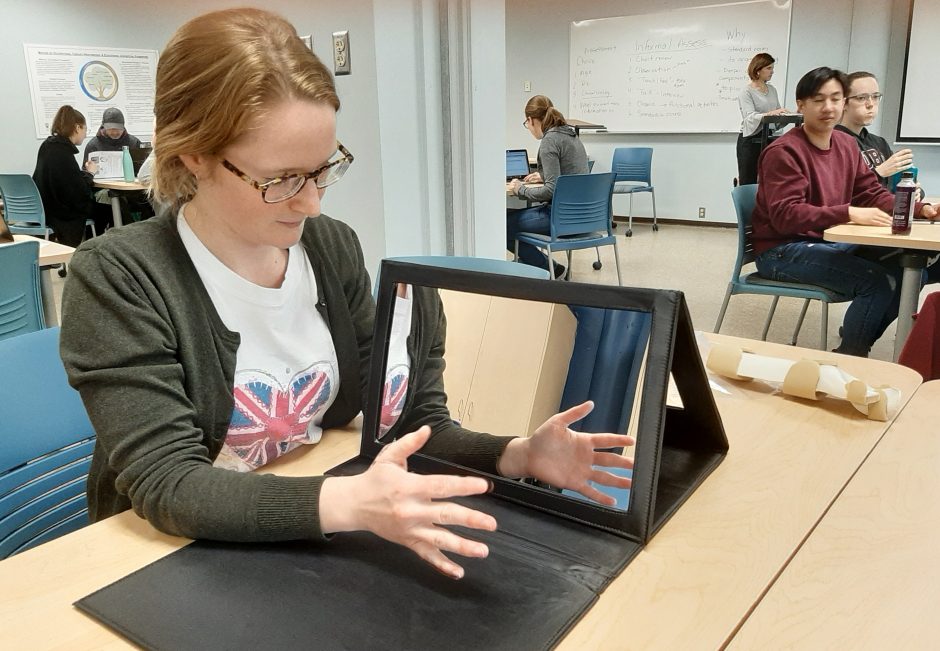
Our Master of Occupational Therapy (MOT) program is a two-year professional master’s degree program, and the only occupational therapy degree program in British Columbia.
Fully accredited by the Canadian Association of Occupational Therapists (CAOT), our graduates are eligible to write the national licensing certification exam upon graduation.
The curriculum is based on a combination of coursework and fieldwork placements, and culminates in the presentation of a paired research project at our annual Capstone Conference.
Ready to apply?
If you know the program is right for you (and you’ve checked our admission requirements), use our step-by-step guide and start your application.
Where would you like to study?
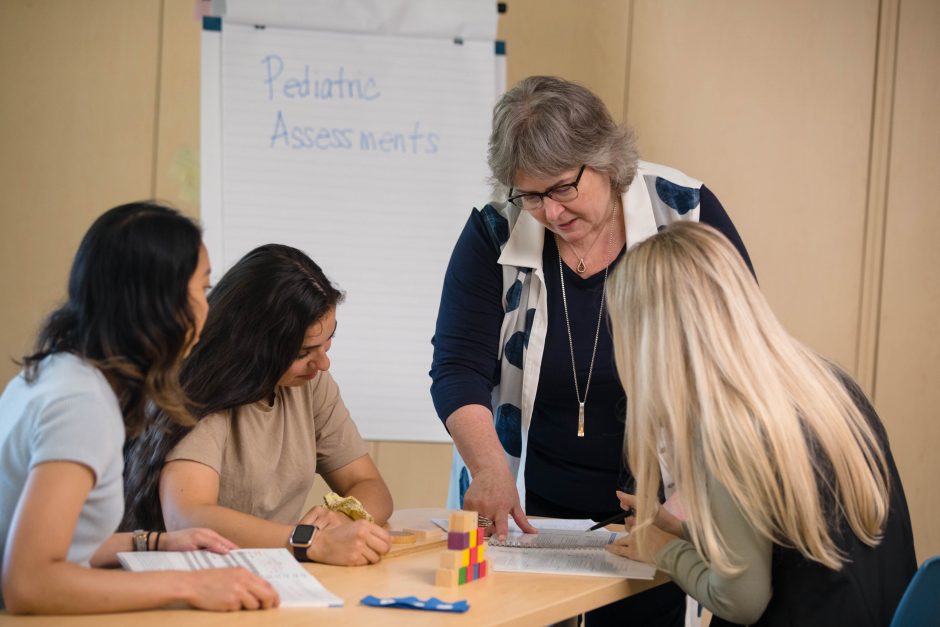
The UBC Master of Occupational Therapy (MOT) program has three geographically distinct sites:
- Vancouver cohort, located at the UBC Point Grey campus
- North cohort, located in Prince George
- Fraser cohort, located across from Surrey Memorial Hospital
- Okanagan cohort, located in Vancouver & Surrey for 2026/27, and at the UBC Okanagan campus in future years.
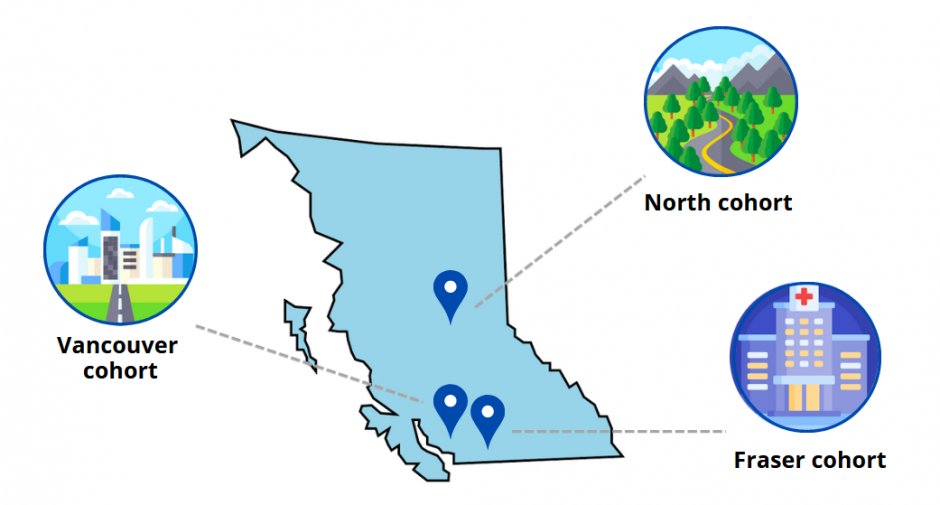
This distributed model of learning uses technology to allow instructors and students to interact in real-time at multiple locations. It is a well-established model with benefits from accessing expertise across the province, learning through both an urban and rural lens, smaller class sizes, and unique placement opportunities in northern and rural regions with special populations.
All MOT students complete the same curriculum at the same time, in the same sequence, with the same points of evaluation, regardless of site.
All sites are well-connected with the latest technology. Larger lectures are broadcast across all sites simultaneously, with smaller group tutorials and lab skills classes taught by lead instructors at each site.
Why choose a career in occupational therapy?
If you enjoy enabling people to live a meaningful life, and want a career that is consistently challenging and involves life-long learning, be an occupational therapist.
With a shortage of occupational therapists across British Columbia and Canada, graduates are also in high demand.
Through your coursework and clinical fieldwork placements, you will have the opportunity to explore your interests and find your niche. Occupational therapists specialize in a variety of areas including, but not limited to, some of the following:
- Children and youth
- Mental health
- Health and wellness
- Productive aging
- Rehabilitation, disability, and participation
- Business and industry
Find out more about occupational therapy:
Program Overview
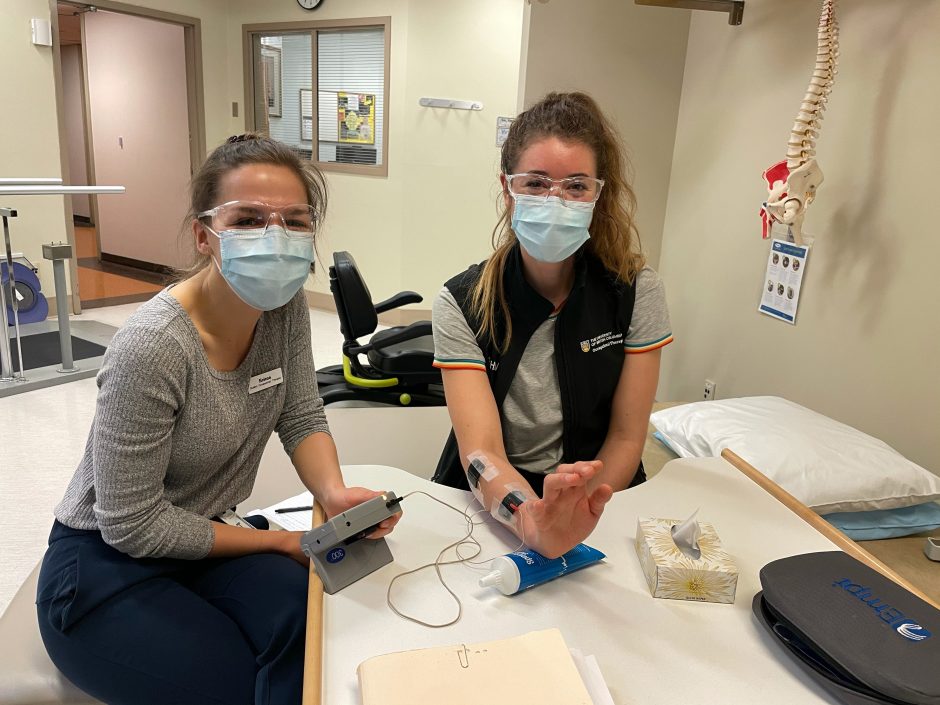
The Master of Occupational Therapy (MOT) program prepares graduates to be exceptional self-directed, life-long learners who consciously use theory, evidence, and critical thinking skills to maintain, evaluate, and improve their practice of occupational therapy.
Our program is anchored in evidence-based and contemporary theories, principles, and beliefs around occupation, health, occupational therapy, social justice, and the education of adult learners.
Strengths of our program include strong experiential, hands-on learning, a diversity of inter-professional and integrated curricula (including programming on cultural safety), and our close connections with the occupational therapy community.
Curriculum & Courses
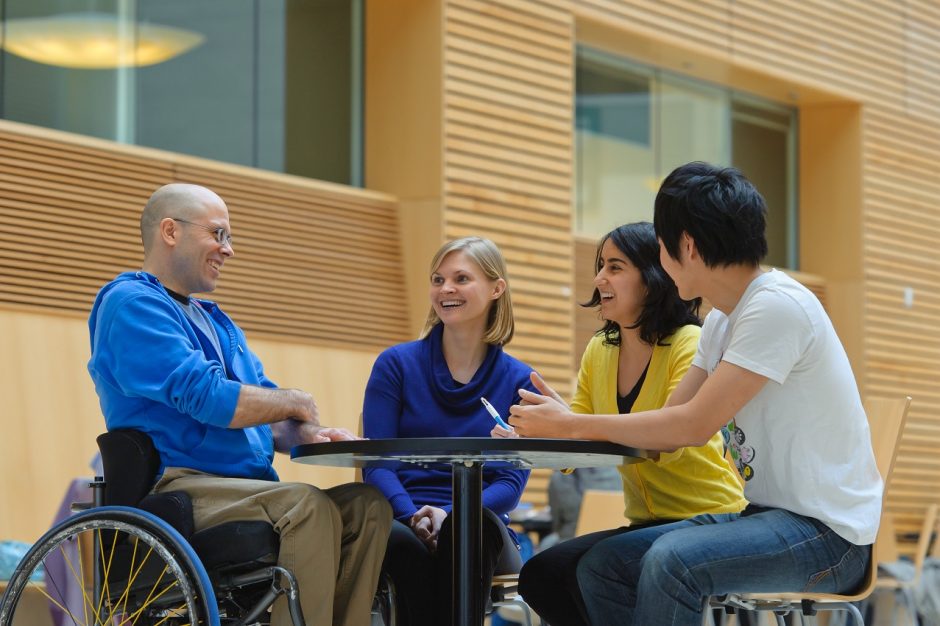
Your program will consist of 15 courses (65 credits), which are organized into six terms of study. A course may be one, two, or three terms in duration.
In alignment with the integrated professional and educational conceptual framework, all courses are designed to address the Profile of Practice of Occupational Therapists in Canada (CAOT, 2012) and the Essential Competencies for Occupational Therapists in Canada, 3rd edition (ACOTRO, 2011).
These principles help to organize and sequence curriculum content to ensure that key practice roles and competencies are addressed consistently and comprehensively.
We cover a balanced program of:
- Theory
- Health, illness and occupation
- Skills for practice
- Evidence for practice
- Professional practice
- Fieldwork
See how these themes flow throughout the program: MOT Curriculum Streams
Please see the UBC Academic Calendar for specific course descriptions:
Curriculum Map
Explore a sample curriculum map to see how the complete curriculum unfolds over two years: Sample MOT Curriculum Map
Program Features
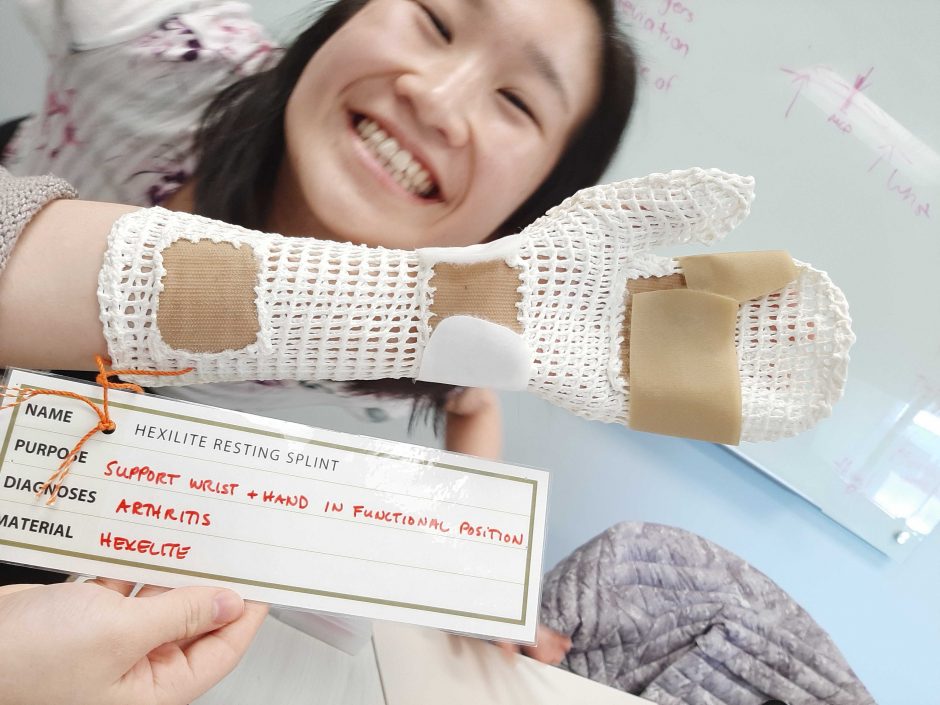
- Vibrant, inclusive community with supportive professors, tutors and instructors.
- Active, long-term links with the practicing clinical community, with excellent opportunities for fieldwork placements.
- High overall faculty to student ratio (approximately 1:4), with lectures (approximately 1:56), labs (approximately 1:28 or 1:14) and case-based tutorials (approximately 1:8).
- Lectures, seminars, live and web-based discussions, along with collaborative and case-based tutorials.
- Interprofessional and integrated curricula are delivered throughout the two-year program.
- Broad range of selected topics are shared with other disciplines, including physical therapy, speech language pathology, nursing, social work, and others health professions at UBC.
- Case-based learning is fundamental to our approach, and provides an exemplary foundation for the complexities of professional practice.
- Emphasis on experiential learning through hands-on skills sessions and the majority of courses include the involvement of clinical faculty and people with lived experience.
- A total of 30 weeks of fieldwork in five different settings are incorporated into the program, encouraging confidence and allowing you to pursue your own interests and specialisms.
Professional & Educational Framework
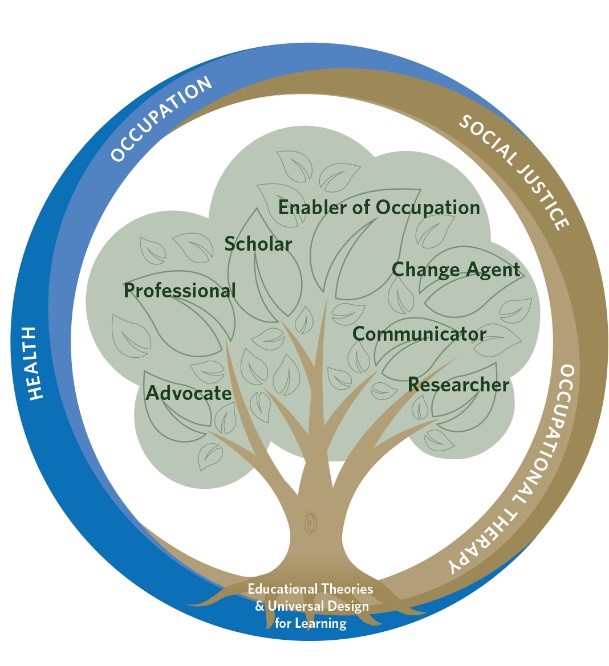
The Master of Occupational Therapy (MOT) professional and educational conceptual framework describes the underpinnings of our curriculum and guides decisions about pre-requisite courses, course content and design, instructional methods, assessment of student learning, and the development of occupational therapy practice competencies.
Our framework is built on two main elements that are then visualized in the MOT Tree:
- Professional element: beliefs about occupation, health, occupational therapy and social justice; the program purpose; key learning outcomes.
- Educational element: four select theories informing teaching in higher education and guiding principles on inclusivity and accessibility.
Learn more about The MOT Tree: Visual Image of the Framework
Professional Element
Our Beliefs
Our beliefs about occupation, health, occupational therapy, and social justice are informed by contemporary and established scholarship in occupational science and occupational therapy. In the MOT Tree, our beliefs encircle the tree as the blue of the sky and water, and the brown of the soil and roots. Just as these elements provide nourishment to a tree, so too to our beliefs enrich all parts of our MOT program.
- Occupation is complex, transformative, and situated in context.
- Health is multifaceted. Community is essential to health and occupation is a determinant of health.
- Occupational therapy’s domain of concern is occupation (performance, participation, and engagement); its theory and practice are holistic and informed by research.
- Social justice calls on us to ensure that engagement in occupation respects human rights and dignity. It is our duty to collaborate, speak up, and act with others to make visible social inequities and occupational injustices, and to transform oppressive systems.
Key Program Outcomes
Upon successful program completion, each UBC graduate will:
- Enabler of Occupation: Demonstrate knowledge, skills, and attitudes required to enable occupation in a variety of settings through use of the occupational therapy practice process.
- Scholarly Occupational Therapist: Demonstrate an understanding of the philosophy, theoretical concepts, models, and frames of reference of occupational therapy.
- Researcher: Demonstrate an understanding of the research process in order to create and disseminate evidence with the outcome having relevance and value to the occupational therapy profession and/or the field occupational science.
- Change Agent: Demonstrate knowledge, skills, and attitudes required for developing and delivering occupational therapy services in a complex, changing environment.
- Professional: Assume and enact occupational therapy professional values and attitudes.
- Communicator: Demonstrate effective verbal and written communication skills.
- Advocate: Communicate the broad purpose and scope of occupational therapy practice consistent with the needs of the audience.
In the visual image, our key program outcomes are highlighted on seven leaves on the MOT Tree. Our program purpose is reflected in the remaining leaves of the tree, symbolizing the “room to grow” of our exceptional graduates as they embark on their occupational therapy careers as life-long learners.
Educational Element
- Transformative learning theory informs how our instructors facilitate students’ ability to connect new knowledge to past learning and experience. We actively engage and expose our students to divergent opinions and ideas, pushing them to be curious about and question the world around them. Our curriculum is designed to move our students to broader understandings of the value of occupation in the world and to developing the professional identity of occupational therapists.
- Critical pedagogy challenges our instructors to make space for students to question the status quo and dominant ideologies. Critical pedagogy is woven through much of our MOT curriculum. For example, over a year and a half in the interprofessional Health Mentors program, MOT students, along with students from other health professions, learn from and with a health mentor, who is a person with lived experience with chronic condition(s) or disability, or a caregiver who provides care to a loved one. Students hear first-hand from the Health Mentors what it is like to experience the health care system in Canada.
- Cognitive load theory describes the need for a goodness-of-fit between students’ capacity to learn, the content to be learned, and the methods used to facilitate learning. Our MOT curriculum is structured so that it builds toward increasingly complex concepts and applications of knowledge across terms, thus mitigating the possibility that, for example, students are tasked to come up with solutions to problems they have yet to encounter or have not received sufficient knowledge to be able to problem-solve effectively.
- Constructivism explains how knowledge is formed, both through subjective and socially constructed understandings. Small group tutorials are a constant throughout the MOT curriculum and offer consistent, supported, and safe environments where students can explore with their peers and facilitators how they are making sense of new learning, how learning integrates across courses, and use case-based learning to facilitate their development of conceptual repertoires to aid their professional reasoning skills.
- Universal design for learning (UDL) principles support inclusion, diversity, and equity for students in our MOT program. The aim of UDL is to expand teaching methodologies and curricular design to accommodate for learning differences and ensure equitable access in educational programming.
- Creation of a respectful and welcoming climate for learning and the promotion of interaction among students and faculty.
- Determination of the essential components of courses, curriculum, and the program.
- Communication of clear expectations around learning and participation in the MOT program to students.
- Use of and flexibility in teaching methods to consider diverse learning styles, ways of knowing, experience, and knowledge.
- Exploration of the use of space and tools for learning to enhance opportunities for all learners.
- Creation of multiple ways for students to access materials and demonstrate knowledge through instructional design and assessment methods.
- Provision of timely and constructive feedback.
- Promotion of interaction among and between faculty and students.
Our Vision, Mission and Values
Read about the values that support our research and our approach as a department.
Tuition & Fees
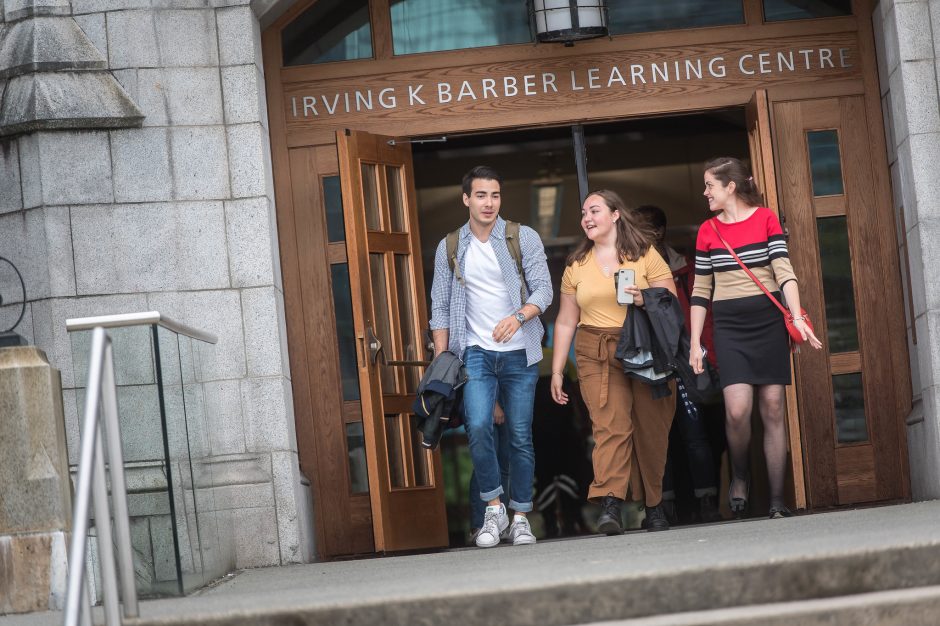
All applicants are required to pay an online application fee to the UBC Faculty of Graduate and Post-doctoral Studies when submitting an online application to the Master of Occupational Therapy program.
Application fees are based on your citizenship at the time of application. You may be required to provide proof of Canadian citizenship, and must provide proof of Permanent Residency.
Tuition fees are reviewed annually by the Board of Governors. In recent years, tuition increases have been 2% for continuing domestic students and between 2% and 5% for continuing international students.
As application fees, tuition and the cost of living change on an annual basis the costs provided below are only an estimate.
For a list of UBC general awards, scholarships, and bursaries, please visit the UBC Awards page. Awards, scholarships and bursaries from within the department are only distributed towards the end of the first year of the MOT program, not prior to application.
Domestic applicants
- Application Fees
- Application Fee: $114.00
- Supplemental Application Fee: $127.25
- Total Application Cost: $241.25
- Tuition
- $16,024.74 total or $2,670.79 in six installments over 2 years
- MOT program fees
- MOT Program Fees (estimated), payable at the start of each academic year
- Year 1: $726.00
- Year 2: $468.00
- MOT Program Fees (estimated), payable at the start of each academic year
- Other course costs
- Estimated Fieldwork Costs:
- Costs for travel, accommodation and daily living vary during placements that occur outside of your home campus location (est. budget $2000 monthly).
- Students wishing to complete a placement in another province must submit a non-refundable fee of $250 plus tax to the National Fieldwork Placement Service (NFPS) for consideration.
- Please note that payment of the fee does not guarantee a placement, and a separate fee is required for each placement requested in another province.
- Estimated Books & Supplies: $1,000 annually
- Estimated Fieldwork Costs:
- Other living costs
- AMS/GSS Extended Health Care Insurance Plan (all students): $264.63 annually
- Estimated UBC Student Fees: $899.00 annually
- Estimated Cost of Living: Starting at $16,453.00 annually
*All fees for the year are subject to adjustment and UBC reserves the right to change any fees without notice at any time, including tuition and student fees. In case of a discrepancy between this page and the UBC Calendar, the UBC Calendar entry will be held to be correct.
International applicants
- Application Fees
- Application Fee: $168.25
- Supplemental Application Fee: $127.25
- Total Application Cost: $295.50
- Tuition
- $101,702.70 total or $16,950.45 in six installments over of 2 years
- MOT program fees
- MOT Program Fees (estimated), payable at the start of each academic year
- Year 1: $726.00
- Year 2: $468.00
- MOT Program Fees (estimated), payable at the start of each academic year
- Other course costs
- Estimated Fieldwork Costs: Costs for all travel, accommodation and daily living vary during mandatory Out of Town placements.
- Students wishing to complete a placement in another province must submit a non-refundable fee of $250 plus tax to the National Fieldwork Placement Service (NFPS) for consideration. Please note that payment of the fee does not guarantee a placement, and a separate fee is required for each placement requested in another province.
- Estimated Books & Supplies: $1,000 annually
- Other living costs
- iMED (for international students): $225.00 payable at the beginning of first year
- AMS/GSS Extended Health Care Insurance Plan (all students): $264.63 annually
- Estimated UBC Student Fees: $899.00 annually
- Estimated Cost of Living: Starting at $16,453.00 annually (Vancouver)
*All fees for the year are subject to adjustment and UBC reserves the right to change any fees without notice at any time, including tuition and student fees. In case of a discrepancy between this page and the UBC Calendar, the UBC Calendar entry will be held to be correct.
Volunteering & Work Experience
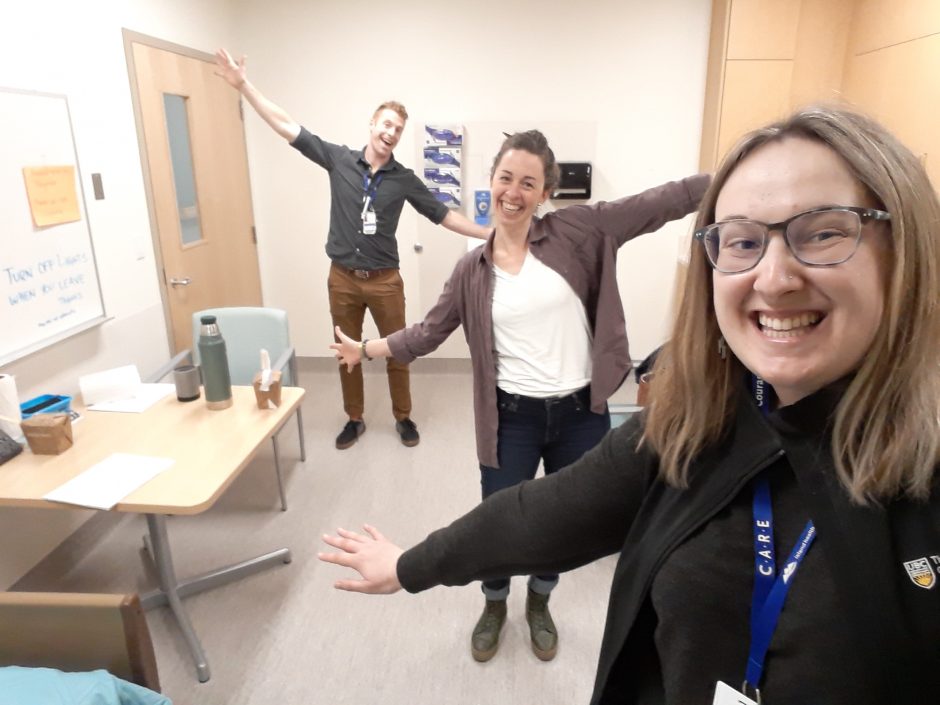
All applicants to the Master of Occupational Therapy program are required to complete a minimum of 70 hours of volunteer or paid work experience that involves direct, meaningful and in-person interaction with persons with physical, cognitive, and/or emotional disabilities.
The organizations and resources listed here have previously offered experiences, and are posted for reference only. They are not guaranteed to currently offer suitable experience and are not guaranteed to fulfill the volunteer/work experience requirement.
It is the responsibility of the applicant to confirm whether an experience is available and whether it fulfills the volunteer/work experience requirement for the purpose of admission to the program.
Volunteering Directories
BC Organizations
- Aquafit For All
- Blind Beginnings
- Canucks Autism Network
- City of Vancouver
- Nikkei Seniors Society
- North Shore Community Resources
- Power For All Adventure Therapy
- Providence Health Care
- Reach Community Health Centre
- Residences for Independent Living Society
- Rock Steady Boxing
- Spirit of the Children Society
- The Kiwanis Pavilion Victoria
- Tonari Gumi (Japanese Community Volunteers Association)
- Vancouver Adaptive Snow Sports
- Vancouver Coastal Health
- Volunteer Prince George
- Windermere Care Centre
- YMCA of Greater Vancouver
Student Profiles
Career Profiles
Admission Requirements
Check your eligibility and confirm your suitability for the program.
How to Apply
Check deadlines and use our step-by-step guide to gather the relevant documents for your application.
Start your Application
Apply for the MOT program through the UBC Graduate Studies Online Application portal.